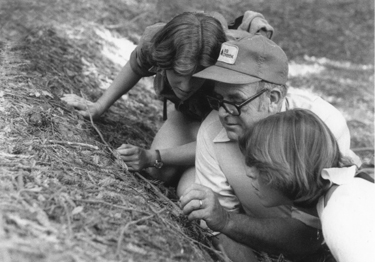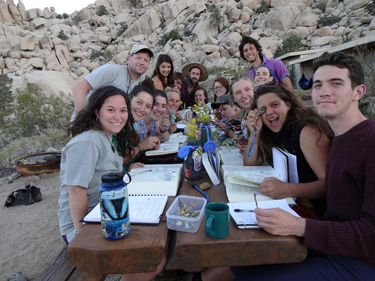Campus News
$2-million gift supports natural history fieldwork at UC Santa Cruz
A $2-million gift from the David and Lucile Packard Foundation in honor of the late professor Kenneth Norris will help ensure that UC Santa Cruz continues as a leader in natural history and at the forefront of educating students to become environmental leaders.


A $2-million gift from the David and Lucile Packard Foundation will help ensure that UC Santa Cruz continues as a leader in natural history and at the forefront of educating students to become environmental leaders.
The gift will provide for two endowments that honor the legacy of Kenneth S. Norris, the late UCSC professor of natural history, and his life-long commitment to field-based education. The first will help fund a new Kenneth S. Norris Center for Natural History; the second will support the Natural History Field Quarter, an immersive course that Norris founded at UCSC more than 40 years ago. Both are within the Environmental Studies department. The gift will also establish a competitive grants program to support natural history research projects undertaken by accomplished undergraduates.
The Packard Foundation grant is one of the largest contributions thus far to the Student Experience Initiative of the $300-million Campaign for UC Santa Cruz.
“UC Santa Cruz is a pioneer in hands-on learning and field education,” said Chancellor George Blumenthal. “This very generous gift guarantees that Ken Norris’s legacy for creating transformative student experiences will continue for many years to come. We are grateful to the Packard Foundation for its generosity and vision.”
Commitment to outdoor learning
UC Santa Cruz has been a leader in field-based education since before the first Natural History Field Quarter class boarded vans and headed for the Mojave Desert in April 1973. Today UCSC offers many other intensive, quarter-long and shorter field immersion classes, a distinct part of Norris’s legacy and an ongoing commitment of teaching and learning outdoors. Each year, approximately 2,000 UC Santa Cruz students deepen their understanding of the natural world through studying and working outside. With the support of the Packard Foundation and others, that number will continue to grow. UCSC provides field-based classes to more students than any other UC campus.
The Kenneth S. Norris Center for Natural History will build upon the existing UCSC Museum of Natural History Collections (MNHC), which includes more than 125,000 specimens of plants, fungi, lichen, marine algae, insects, fish, amphibians, reptiles, birds, and mammals.
The MNHC is a place where students, faculty, and community members connect and learn about the biodiversity of California. It supports faculty research, helps teach students vital skills, and provides a learning community in which students teach each other. Permanent funding of the Norris Center will provide support for continued and enhanced collaborations with our Campus Natural Reserve, which currently supports field-based learning and research opportunities for more than 30 courses, 2,500 students, and nearly 100 interns each year.
The Ken Norris Center is envisioned as a dynamic, on-campus natural history resource center that includes a reference library, meeting and learning space, and access to the campus specimen collections. It will support more hands-on learning opportunities through internships and laboratory and field activities in undergraduate classes and will expose undergraduates to natural history training opportunities early in their college careers.
Ken Norris and NHFQ
Norris was legendary for his ability to inspire students to develop their skills as naturalists. Though he retired in 1990, he remained active in teaching and research until shortly before his death in 1998.
An acclaimed marine-mammal researcher, Norris also led the effort to establish the University of California Natural Reserve System in 1965, a network of protected natural areas in California. Today, its 39 sites include more than 756,000 acres, making it the largest university-administered reserve system in the world.
Each spring for more than 20 years he led two-dozen NHFQ students into the mountains, forests, and deserts of California to learn from nature firsthand. More than 1,000 students have taken the course since the beginning. In 2012, more than 500 returned to campus to celebrate its impact on their lives.
Close, direct personal observation of living organisms and natural ecosystems is the foundation for practicing natural history. Naturalists bring this practice into their broader lives and careers, often as scientists, teachers, artists, land managers, or informed community members. Their training in introspective observation ultimately engenders a deep love and respect for the natural world.
On four or more week-long-plus field trips to Natural Reserves in various parts of the state, NHFQ students observe the natural world and learn the process of critical evaluation. They record their observations in detailed field journals, along with questions, insights, hypotheses, and conclusions. Instructors teach basic skills in plant systematics, floral anatomy, bird identification, scientific illustration, geology, observational techniques, nature writing, and field journaling.
Policy implications and management issues, as well as philosophical and ethical questions, are integrated into discussions. Collaborative learning is emphasized as students research specific, place-based topics during the time between trips, and then present their findings to the rest of the class while in the field.
With the Packard Foundation gift, UCSC will continue to inspire new generations of naturalists, both through NHFQ and the new Norris Center. The NHFQ alumni group that organized the 2012 reunion plans to create a “Friends of the Norris Natural History Programs” group to assist with future fundraising. It will also encourage greater professional networking between alumni and graduating students.
Professor Norris, who never took himself too seriously, always incorporated an element of fun into whatever he asked of his students. He delighted in discovery and sharing the excitement of discovery with others. At the beginning of field classes, he would often say: “We’re off on the greatest adventure of our lives!”
The Campaign for UC Santa Cruz provides critical resources to support the Student Experience and the other key initiatives in Genomics and Health, Coastal Sustainability, Data Science Leadership, and the Institute of the Arts and Sciences. In these initiatives and in each Academic Division, gifts support what education and research mean at UC Santa Cruz: bold, fearless inquiry that benefits our students, our community, and our planet.